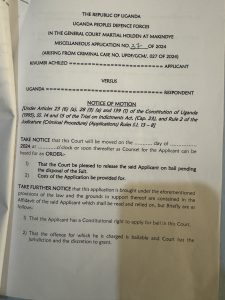Makindye, Uganda – September 17, 2024
The highly anticipated Makindye General Court Martial session was unexpectedly postponed today, leaving the families, legal teams, and supporters of political comrades Agaba Anthony, also known as Bobi Young, and Achileo Kivumbi in a state of frustration. The court had been scheduled to hear bail applications for both individuals, whose cases have garnered widespread attention amidst Uganda’s escalating political tension. However, the hearing did not take place as planned, with new dates now set for the 24th of September and 21st of October, 2024.

A Glimpse Into the Cases
Agaba Anthony, widely known as Bobi Young, is a close associate of opposition leader and National Unity Platform (NUP) President Robert Kyagulanyi, also known as Bobi Wine. He has been an outspoken critic of President Yoweri Museveni’s regime, advocating for human rights, democratic reforms, and the end of what he and his comrades describe as systemic political oppression. Bobi Young was arrested in early 2024 on charges that remain vague but are believed to be politically motivated, like many of the charges levied against opposition supporters in Uganda.
Achileo Kivumbi, another significant figure within the NUP, has also been incarcerated under murky circumstances. Kivumbi’s arrest followed a series of protests against Museveni’s government earlier this year, during which the opposition accused the authorities of excessive force and unlawful detentions. Kivumbi’s ongoing detention has been condemned by various human rights groups, who argue that his case symbolizes the repression of political dissent in Uganda.
Both men have been in custody without trial for months, with human rights organizations continuously raising alarms over the lack of transparency and due process in their cases. Their incarceration highlights the Ugandan government’s increasing reliance on military courts to try civilians, especially political figures, under the pretext of national security concerns.
Bail Postponements Spark Concerns
The postponement of their bail applications has further exacerbated concerns over the deteriorating rule of law in Uganda. Bobi Young’s bail application, initially expected to be heard today, has been pushed to the 24th of September, 2024. Achileo Kivumbi, on the other hand, will have to wait until the 21st of October, 2024, for his bail application to be considered.
The delay in court proceedings has raised suspicions among human rights defenders and opposition figures, who claim that the judiciary is being used as a tool for political repression. Critics argue that such postponements are part of a broader strategy to demoralize opposition supporters and silence critical voices ahead of the 2026 general elections.
“Every time they push the bail hearings, they are essentially denying these comrades their basic rights. These are not cases about law and order but about silencing political dissent,” said one of the legal representatives for Bobi Young.
He continued, “We fear that such delays are being orchestrated to keep them behind bars indefinitely, which is a violation of Uganda’s legal and constitutional standards.”
Growing Tension Among Opposition Supporters
Outside the court, a somber mood prevailed among the crowd of NUP supporters who had gathered in solidarity. Many wore red, the official color of the party, and carried placards demanding the release of all political prisoners in Uganda. The repeated delays in the bail process have sparked growing disillusionment among opposition supporters, who believe the government is using the military court system to suppress political opposition.
Speaking to supporters gathered outside the Makindye General Court Martial, one of the NUP coordinators expressed disappointment. “Our comrades have been unlawfully detained for too long. This is not just a delay; this is a deliberate effort to keep them in jail without any evidence or trial. But we will continue to demand justice.”
NUP leaders, including Bobi Wine, have repeatedly condemned the military court’s handling of political cases, accusing it of acting under the direct influence of the ruling National Resistance Movement (NRM) government. “This is not about justice; it’s about silencing those who stand for the truth. We will not be silenced,” Bobi Wine stated in a recent interview, referencing the continued detention of his party members.
International Community’s Response
The international community has also been keeping a close watch on the developments surrounding these cases. Several human rights organizations, including Amnesty International and Human Rights Watch, have issued statements condemning the Ugandan government’s treatment of political prisoners. They argue that the military court system lacks the impartiality necessary for fair trials and is being used as a political weapon against the opposition.
“The continued use of military courts to prosecute civilians in Uganda is a gross violation of international human rights standards,” a spokesperson for Amnesty International said. “Agaba Anthony and Achileo Kivumbi must be afforded a fair trial, and their rights as Ugandan citizens must be respected.”
Diplomats from Western countries have also expressed concern about the political situation in Uganda, calling for dialogue between the government and opposition forces to resolve the increasing political tensions peacefully.
What’s Next?
As the new dates for the bail hearings approach, the families and legal teams of Bobi Young and Achileo Kivumbi remain determined to fight for their release. However, the postponements have cast a shadow of uncertainty over the process, leaving many wondering whether justice will be served in a country where the political landscape is increasingly marked by authoritarianism.
For now, both men remain in custody, while their supporters continue to demand their release, hoping that the court martial will finally convene as scheduled on the newly appointed dates.
In the meantime, the eyes of Uganda—and the world—remain fixed on the Makindye General Court Martial, waiting to see whether the rule of law will prevail or whether political repression will continue to shape the course of justice in Uganda.